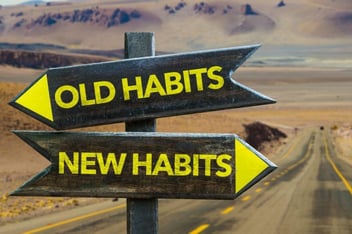You’re probably doing this -- right now.
There are destructive habits you’re completing over and over again that are making you less productive, effective, wealthy and healthy -- in some cases, without you even realizing it.
Here’s the thing.
You are your bookkeeping business, so if you keep doing what you’ve done, your results will never really change.
If you want your enterprise to improve, YOU have to elevate your game too.
So, how do you do this?
It’s time to create positive new habits.
Don’t worry. There are 4 easy ways to make this happen and they’re from, Belle Beth Cooper, the co-founder of Hello Code, which makes Exist, a cool app that connects all your services to turn that data into insights about your life.
1. Start Small
BJ Fogg is the king of starting small with new habits, and his program Tiny Habits focuses on this approach. The idea is to focus on building the habit itself, rather than worrying about how big the impact is.
Here's a good example: Say you want to start a habit of flossing your teeth every night.
To build a successful habit, start with something tiny: flossing just one tooth. I know it sounds crazy, but it works. If you're building the habit of flossing just a single tooth each night, three things will happen:
You'll feel silly about not doing it. Flossing a single tooth is so easy it's hard to feel OK about skipping it.
You'll probably floss more than one tooth. Getting started on anything is the biggest hurdle. Once we've started, it's easy to just keep going.
You'll build the habit. Although flossing just one tooth each night probably won't make your dentist happy, after a few weeks have passed the action will start to become a habit-something you do automatically, without thinking.
Once you've built up the habit then you can incrementally add to it. In our example, you'd start flossing two teeth per night, and then three, and soon you'll be flossing all of your teeth without having to think about it.
Now let's look at some examples of how you could apply this method to building healthy work habits:
Develop the habit of single-tasking.
If you're struggling to stay focused and beat distractions, focus on building the habit of working on a single task at a time.
Start by doing that for five minutes at a time. After five minutes, relax and allow distractions.
Later, try another five minutes of pure focus. When five minutes becomes easy, work on doing 10 minutes at a time, and then 15.
Soon you'll find you can spend half an hour on a task without struggling to stay focused.
Develop the habit of drinking more water.
What if you wanted to drink more water during your workday? Start small with just one extra glass of water. You can even make it a really small glass. Just drink one extra glass a day for a month.
If you're still struggling after a month, keep practicing (and check the other strategies I've mentioned here for more help). Once you have the habit down you can upgrade to a larger glass and later add a second one.
Develop the habit of staying organized.
Trying to be more organized and stay on top of your calendar? Start with a weekly reminder to look over your calendar for the coming week.
Each Sunday night when your reminder sounds, take a minute to look the events you have scheduled for the week. When you find that's easy and can do it without thinking, try setting an alarm every night to review the next day's calendar.
2. Stack Habits
One of the most powerful methods for building new habits is to stack them on existing habits.
We all have plenty of existing habits: getting your morning coffee, logging on to your computer, walking to the train station after work, eating a midmorning snack.
You do those things without thinking about them. They're habits.
So use those habits as triggers for new habits.
Here are some examples.
Increase exercise. To exercise more, stack a new habit on your morning coffee. Every time you get your coffee, take a walk around the block. Or start getting your morning coffee at a cafe a little farther from work so you naturally have a longer walk.
Strengthen work relationships. To get to know your colleagues better, stack a new habit on your midmorning snack or bathroom breaks. Every time you get your snack, stop for five minutes to chat with people in the break room. Or when you go for a bathroom break, stop and chat with someone on the way back to your work area.
Read more. To read more, stack a new habit on your commute. Grab an audiobook to listen to. Or every day when you have lunch -- which is surely an existing habit -- take a book with you.
There are plenty of ways to stack habits together. Start with something you do every day and use that as a trigger to remind you to do your new habit.
Just pick a habit so small and easy that it's not difficult to perform, and attach it to a trigger that happens every day around the same time -- that's an awesome way to build new work habits.
3. Make it Obvious
Another of my favourite tricks for building habits is to put the tools you need right in front of you. Having whatever equipment you need easily available removes the barrier of getting started and acts as a reminder.
Drink less soda. Say you want to drink less soda and more water while you're at work.
Keeping a water bottle on your desk means you don't have to get up; you can just reach out and take a sip while you're working. Plus, seeing the water bottle all day serves as a reminder to keep up your habit.
Exercise at lunch. If you want to go for a jog or hit the gym during your lunch break, put your equipment in easy reach. Set your running shoes or gym bag beside your desk so you can quickly grab them as you head out the door at lunchtime.
Leave work on time. When your habit isn't based on something physical, you can still use this technique. The trick is to make any barriers to acting on your habit easy to overcome.
Say you're trying to build a habit of leaving work on time every day. If you make plans with your family or friends after work each night you'll have a good excuse that pulls you away from your desk. Your plans don't have to be complicated; they could be as simple as setting a specific time your family has dinner every night. Take it a step further and make it an appointment in your calendar.
4. Reward Yourself
Now for the fun part: Every time you perform your new habit, celebrate it. Reward yourself for putting in the effort.
Charles Duhigg, author of The Power of Habit, is a big proponent of rewarding yourself after completing a habit. Duhigg's approach to habits is based around a simple three-part cycle: the cue or trigger, the habit itself then the reward.
After building up enough of these, Duhigg says, "when your brain is exposed to a certain cue, it'll kind of go on autopilot, because it craves the reward it expects to come at the end."
Building up habits over time means focusing on doing something small every day (or very often, if not every day).
Celebrating each time you complete a habit reinforces the value of doing that small thing over and over, rather than reaching for a far-off goal.
If you're trying to lose weight, weighing yourself every day can be demotivating if you don't see much progress. Rewarding yourself every time you go to the gym, on the other hand, helps you to build up a lasting habit of regular exercise -- regardless of the long-term consequences.
Rewards can come in any form that makes you feel good about sticking with your habit. It might be stopping for a break, having a snack, or simply patting yourself on the back.
A good way to make sure you're staying on track and rewarding yourself for your progress is to use an app like Lift or Balanced to check off your habit each time you perform it.
If you struggle to stay on track or you need a bigger reward to stay motivated, try grabbing an accountability partner. Find a colleague or friend who will keep you accountable and cheer you on when you succeed. (I always tell my co-founder when I go for a run, and his support makes me feel even better about sticking with my habit.)
Most importantly, just pick one habit to build up at a time. It's really easy to get overwhelmed by trying to make several changes at once.
Plus, once you've successfully built one new habit, you have another starting point for stacking on a new habit!
Some terrific suggestions.
Which of the above tips most resonated with you?
What habit will you add to your arsenal today?
Remember, your personal development is in your own hands, so don’t delay.
Your bookkeeping business will thank you for it.
To your success,
Michael

Article by Michael Palmer
Michael is the CEO of Pure Bookkeeping, the host of The Successful Bookkeeper podcast and an acclaimed business coach who has helped hundreds of bookkeepers across the world push through their fears and exponentially grow their businesses and achieve the quality of life they've always wanted.
Subscribe Now
Recent Posts
- Pricing Strategies for Bookkeeping Services in 2025
- Getting Started with Your Own Bookkeeping Business: A Step-by-Step Guide
- AI in Bookkeeping: Trends to Watch in 2025
- Understanding the New Quality Management Systems Law and Its Impact on Bookkeeping Businesses
- What’s Your Biggest Financial Goal for 2025?




